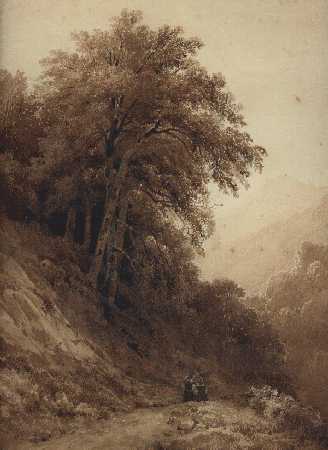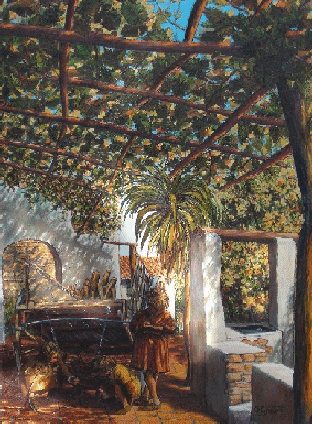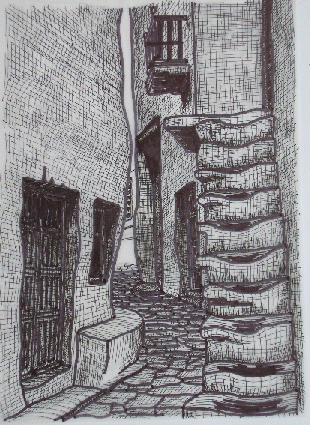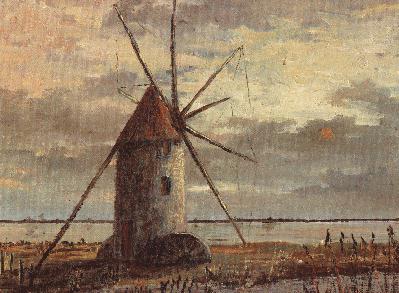
Travel to Spain
And yet, nevertheless, I know well that my clothes are still imbued with the scent of the lake of Geneva where I spent all my youth. When I speak French, I have the vaudois accent and I still compare the taste of Spanish or Italian white wine with the wines of my home: The Lavaux, the Yvorne or the Mont-sur-Rolle. When the Tramontane, the Levante or the Mistral ruffle my hair, I make my friends laugh by saying "- The bise is bringing back the sun to us".
The other day, when listening to the famous melody of the opera Cavalleria Rusticana, I whispered into the ear of my wife, Etta, who is Italian :
- With a voice and music like that, how can one not speak the truth?
- Ah, little Swiss man, she replied laughing, you have not get understood everything : with us treachery is always hidden in charm.
Momentarily, my eyes filled with nostalgia and I saw again, as if I was there the honest splendor of the big lake sparkling below the Alps.
When I was little, I was told that the silhouette of Mont Blanc was like the profile of Napoleon on his deathbed. It is because this imposing scenery would have been fitting to certain illustrious events. A bloody battle which would have changed the course of history, a universal warrior who would have turned the world upside down. But no one has ever thought of making use of the landscape and nothing of any importance has ever happened round the lake of Geneva. At the most a few tales of people stealing chickens, on one occasion an attack against the people of Geneva by some Savoyards but it was enough for someone to upset a bowl of soup on their heads for all to be put right again. Later, yes there was Calvin. But first of all, he was a Frenchman and then, as I have heard say, "-It was without evil intentions!"
* * *
It was at Lausanne University that I followed the courses of the famous Professor Badoux. It was he who showed me the incomparable charm of natural science and of intellectual curiosity. I remember the endless walks on foot that we made with Badoux through the Alps. For instance it was a question of hunting for the proof that such and such a little fold in the rocks had occurred at a different moment to that pointed out by another learned man, in a book published in 1860!
In the evening in a mountain inn, this point was endlessly discussed. And then by a petrol lamp, our arguments veered off on to literature, poetry or painting. The good peasant woman at the back of the bar, was yawning while the hours of sleep slipped away.

Prealps seen by the Swiss painter Alexandre Calame (1810 - 1865)
collection of the author
At that time, Lausanne University was situated in an incredible building. A pompous imitation of a Florentine Renaissance palace. Something about as bizarre as the gothic organ in Captain Nemo's submarine.
It is said that the Parisian architect who at the beginning of the century made the plans for this palace, thought that it was on the edge of the lake! So there are nothing but steps coming up out of the water, enormous mooring rings hanging from the facade. On his first visit to the building works, the unfortunate man saw that far from emerging out of the romantic water of the lake of Geneva, his palace looked out over the cattle market with its customary smells.
However he did not waver in his aesthetic convictions. Once one has with both hands pushed open the enormous entrance door, at least four yards high, one sees the monumental staircase which is the main feature of the building.
After that, a strong smell of formalin pricks your nose. It is because the Zoological Museum is just next door.
The grandiose staircase then divides into different branches. One of them and you have to know it in order not to lose yourself, disappears elegantly down a very drab passage, blackish and smelling of urine. Further on still and right at the end, the glass doors of the Institute of Geology and Geophysics.
Millions of books, collections which are as dusty as they are varied, a few microscopes and a laboratory which doesn't contain anything other than a coffee machine.
I spent marvelous years there, turning round and round in my head the rough draft of my future.
Around me, my friends discussed political controversies. At that time, the topic was decolonization, the Algerian war, Jean-Paul Sartre and Raymond Aron. The antagonistic ideas of the latter two old gentlemen bubbled away like a great pot on the fire. It all smelt of pipe smoke, black coffee and the big pullover being knitted by a young girl with perfumed fingers.
The delicate happiness of intellectual controversy.
However one day., I got tired of it. Without any particular reason, I got up, picked up from the table the remains of my packet of cigarettes and went away without much desire to return, on an endless journey across the Mediterranean. From North to South, from East to West. A long search of horizons, of ideas and of new friends.
* * *
And then many years later, the hours of weariness struck once more. We had decided, Etta and I, to bring an end to our wanderings. It was the end of autumn or the beginning of winter. All the North of Italy and French Provence was engulfed in a thick silent fog. We were in the car, more or less lost in the windings of a little road in the Pyrenees. Suddenly and just as witches can come out of a wall, the car burst out of the fog. A bright new ray of sunshine illuminated a rusty signboard:
Spanish Frontier
 |
Drawings by O.Gonet
Enraptured we saw the summer flower again, while we were going down towards Cataluña. The pine trees were stretching and cracking under the sun, the undergrowth exuded a scent of garlic, of rabbit and of cookery with thyme. The impression of arriving somewhere was extraordinarily comforting. We had entered into I don't know what little fishing village. The place was black with people, it was a fiesta. Stupidly, suitcases in hand, we had attempted to pass through the crowd to reach the door of a hotel. Suddenly a fanfare of flute players struck up, on a high register, a tune which seemed reminiscent of our memories of bull- fights. The suitcases fell from our hands and the people drew us into a kind of round dance, hopping like little girls.
It was the end of the journey, we had arrived.

Oil painting by O.Gonet
We have set ourselves up in a little white house in Javea, to the South of Valencia. At that time, the tremulous voice of General Franco was making its last exhortations on the radio. It concerned perhaps the big cities but here, in Javea, people paid no attention. They lived among themselves, rubbing shoulders, coming together each evening in dark kitchens or on a row of chairs in front of the doorways.
A small world, warm, clothed in black, hard working, secretive, nearly always on the eve of celebrating some fiesta, festooned with little colored papers. They maintained great respect for their fascinating past and an infinite patience in the face of life's difficulties.
Coming from a generation which had known great material difficulties, they took care of their pennies when purchasing things, but in exchange for two fingers of sincere friendship and consideration, they recovered the generosity, hospitality and nobleness which are the three graces of the Iberian culture.

Drawings by O.Gonet
And then, the Spaniards are the most musical in the world. There is no getting together without music and song. Bricklayers on their ladders know by heart innumerable tunes to which they put words invented as they go along. Our early knowledge of Spanish enabled us to discover with amazement the words of these excellent flamenco melodies:
"- Oh how hot it is on this la-a-a-der, how much better it would be on the be-a-a-ach, oh how I would like a glass of be-e-e-r"
* * *
Shortly after our settling in at Javea, the death of the generalissimo was announced with sobs on the radio by the prime minister. The event caused a certain amount of apprehension.
In the rather naive hope of being able to follow a programme of historical perspectives, we hired a television. Well, for two days and two nights, a camera, probably hidden just behind the head of Franco lying in his coffin, filmed nothing but the endless file of people who in fine closely packed rows had just paid their homage to him. Close up and low-down on the screen one could see the corpse's two shoes sticking up. There was no commentary, no noise except for the treading of the crowd and a few suppressed coughs.
At times a speaker with a face ravaged by grief, read with care, the telegrams of condolence. The date, the place, the text and all the official titles of the signatory and then... back to Franco's shoes.
Two days and two nights.
* * *
The disappearance of the general was going to allow, among other things, a considerable relaxation of the strict cinema censorship. To take advantage of this, Etta, who loves the cinema, got the idea of helping to start up a cine-club.
At that time, the little Spanish towns were not completely open to the technical refinements and showiness of modern life. I remember particularly the hall where the film shows took place. It smelt of hot rubber, the armchairs were losing their stuffing but the public were marvelous.
The young nibbled sunflower seeds of which the husks flew in shadowy showers across the screen. Others played cards under the low lights of the lavatories. The children cried with sleepiness on the knees of their mothers who were completely taken by the captivating glances of actors. A courageous policeman, with a three cornered hat made of cardboard, took charge of discipline at the opening of the film.
At the first showing, there were reels of film forty years old. The reputation of the actors reached the town a generation late. The lads were caught by the actress in Charlot The Dictator's and the girls by an Italian actor who had died of old age years ago.
Sometimes, the operator got entangled in the workings of the projector and the film accelerated sharply. The characters began to speak like little birds, they banged their heads kissing one another then went down the stairs at breakneck speed. The public were thrilled.

Oil painting by O.Gonet